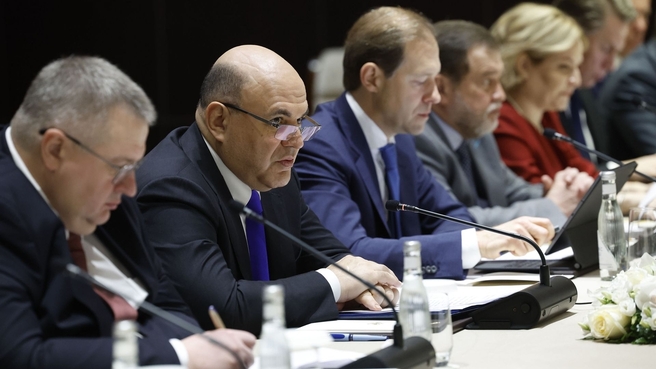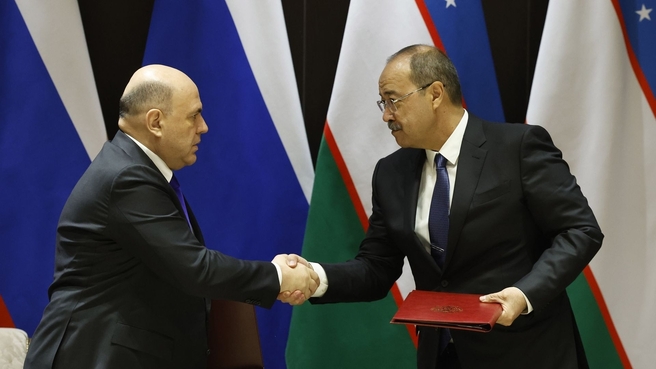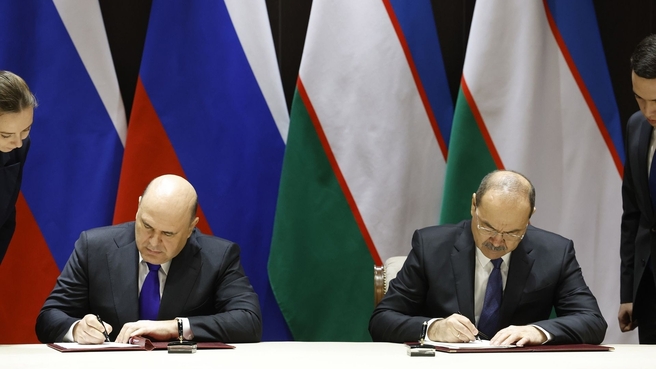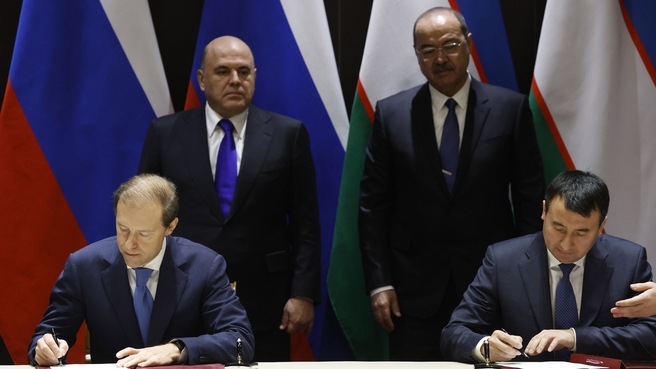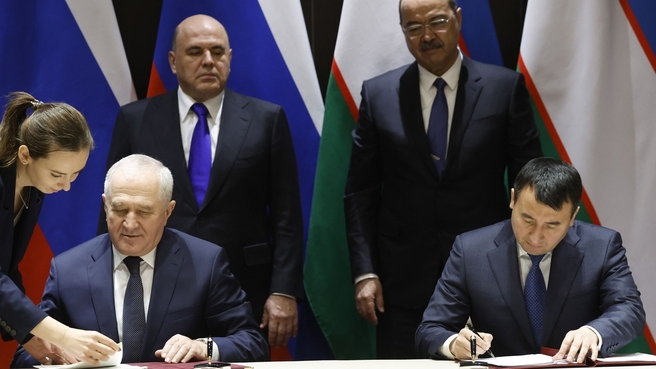The third meeting of the commission took place during Mikhail Mishustin’s working visit to the Republic of Uzbekistan.
Documents signed following the meeting
Meeting of the Russia-Uzbekistan Joint Commission at the level of heads of government
Mr Abdulla Aripov, I am very happy to meet with you again and to have this opportunity to visit fraternal Uzbekistan and discuss prospects for our further cooperation. I would like to sincerely thank you and our Uzbek friends for warmly receiving the Russian delegation in Samarkand. This is one of the most ancient cities in Central Asia, and it is widely known in Russia; it has a very long history and a rich cultural legacy. I am confident that its unique atmosphere and climate will facilitate an open and productive conversation, as well as our joint work.
Uzbekistan is Russia’s long-time and reliable partner and ally. Relations between our countries are based on the principles of friendship, neighbourliness and mutual respect. They do not depend on the situation now shaping up in the world. The work of the joint commission at the level of prime ministers confirms the special nature of Russian-Uzbek ties. Today, we are holding its third meeting. The Russian Federation maintains this special cooperation format with only a few countries.
We have established a substantial contractual and legal framework, and about 340 agreements are currently in force. This past September, our leaders, Vladimir Putin and Shavkat Mirziyoyev, signed the Declaration on Comprehensive Strategic Partnership between Russia and Uzbekistan. I am confident that this document is elevating our relations to a new and higher level.
We have just concluded our restricted format session with you, Mr Aripov, where we considered the most important issues on the bilateral agenda that determine the parameters of our work in the long term. Once again, I was convinced that we are all striving for progressive development and multifaceted cooperation between Russia and Uzbekistan.
Now we will discuss specific steps to promote cooperation in the trade, economic and cultural spheres. We will focus on expanding cooperation in industry, agriculture, and the fuel and energy complex, medicine, and education. Russia is a leading trade partner with Uzbekistan. We mentioned that it now leads in the republic's foreign trade. Exports increased by more than 11.5 percent, and imports by almost 40 percent. Over 10 months, mutual trade has grown by 30.5 percent, approaching $7 billion. During this period, Russian imports showed an increase of almost a quarter, and exports of 1.5 times more. And it is important not to stop there. Our presidents Vladimir Putin and Shavkat Mirziyoyev have set a major objective: increase bilateral trade to $10 billion. I am sure that we can do it. To achieve this ambitious goal we need to provide new impetus and use every available resource in key areas that will become the drivers of trade and economic cooperation.
Energy is among the most promising areas. The largest Russian companies are operating in Uzbekistan. Oil and gas and electric power projects are being successfully implemented. The total volume of Russian investment in the energy sector is $12 billion. Yesterday, Mr Aripov, we discussed a number of projects in detail with our colleagues. We consider it important to strengthen cooperation in nuclear energy. The joint construction of a Russian-designed nuclear power plant would be a large project. We need to expedite the implementation of the agreements we have reached.
We also welcome our Uzbek partners’ interest in deepening industrial cooperation. Interesting initiatives are being discussed in the automotive and aircraft industries, as well as in pharmaceuticals. Large investments are being made in mechanical engineering and metallurgy.
Over the past five years, the number of companies created in Uzbekistan with Russian capital has exceeded 2,500, Uzbek businesses have registered over 600 companies in Russia.
I believe that the economic business forum, which is being held now in Samarkand and which Mr Aripov and I attended today, will help strengthen ties between both countries’ businesses and will serve to launch new and promising projects. Mr Aripov and I agreed to hold this forum annually.
We can see great potential for cooperation in agriculture. In 10 months of this year, bilateral trade in agricultural products and foodstuffs increased by almost 40 percent, approaching $1.5 billion.
Russia is ready to increase the export of sunflower oil, confectionery, and wheat; there also are proposals for other goods.
The focus of our constant attention is the deepening of cooperation between Uzbekistan and the EAEU. The processes of regional integration have actually proved their effectiveness; this is the dominant trend in the development of the global economy. They make it possible for us to successfully face new challenges, and provide stability during periods of market instability, trade wars, increasing protectionism and sanctions pressure.
The negative impact of external factors is noticeably mitigated by cooperation ties, strong production supply chains, and the complementarities of our economies. Eurasian integration provides a significant advantage for people in the member countries. It not only contributes to the growth of their well-being, but also helps to exercise freedom of movement, and to choose a place of residence and work. Additional business opportunities are emerging due to the opening of new sales markets and the creation of conditions for fair competition. The EAEU is a modern regional integration format that has gained serious weight in the international arena since it was formed. In such a difficult geopolitical and economic situation, the union has proven its effectiveness and resistance to the sanctions pressures from unfriendly states.
We have just concluded our restricted format session with you, Mr Aripov, where we considered the most important issues on the bilateral agenda that determine the parameters of our work in the long term. Once again, I was convinced that we are all striving for progressive development and multifaceted cooperation between Russia and Uzbekistan.
Now we will discuss specific steps to promote cooperation in the trade, economic and cultural spheres. We will focus on expanding cooperation in industry, agriculture, and the fuel and energy complex, medicine, and education. Russia is a leading trade partner with Uzbekistan. We mentioned that it now leads in the republic's foreign trade. Exports increased by more than 11.5 percent, and imports by almost 40 percent. Over 10 months, mutual trade has grown by 30.5 percent, approaching $7 billion. During this period, Russian imports showed an increase of almost a quarter, and exports of 1.5 times more. And it is important not to stop there. Our presidents Vladimir Putin and Shavkat Mirziyoyev have set a major objective: increase bilateral trade to $10 billion. I am sure that we can do it. To achieve this ambitious goal we need to provide new impetus and use every available resource in key areas that will become the drivers of trade and economic cooperation.
Energy is among the most promising areas. The largest Russian companies are operating in Uzbekistan. Oil and gas and electric power projects are being successfully implemented. The total volume of Russian investment in the energy sector is $12 billion. Yesterday, Mr Aripov, we discussed a number of projects in detail with our colleagues. We consider it important to strengthen cooperation in nuclear energy. The joint construction of a Russian-designed nuclear power plant would be a large project. We need to expedite the implementation of the agreements we have reached.
We also welcome our Uzbek partners’ interest in deepening industrial cooperation. Interesting initiatives are being discussed in the automotive and aircraft industries, as well as in pharmaceuticals. Large investments are being made in mechanical engineering and metallurgy.
Over the past five years, the number of companies created in Uzbekistan with Russian capital has exceeded 2,500, Uzbek businesses have registered over 600 companies in Russia.
I believe that the economic business forum, which is being held now in Samarkand and which Mr Aripov and I attended today, will help strengthen ties between both countries’ businesses and will serve to launch new and promising projects. Mr Aripov and I agreed to hold this forum annually.
We can see great potential for cooperation in agriculture. In 10 months of this year, bilateral trade in agricultural products and foodstuffs increased by almost 40 percent, approaching $1.5 billion.
Russia is ready to increase the export of sunflower oil, confectionery, and wheat; there also are proposals for other goods.
The focus of our constant attention is the deepening of cooperation between Uzbekistan and the EAEU. The processes of regional integration have actually proved their effectiveness; this is the dominant trend in the development of the global economy. They make it possible for us to successfully face new challenges, and provide stability during periods of market instability, trade wars, increasing protectionism and sanctions pressure.
The negative impact of external factors is noticeably mitigated by cooperation ties, strong production supply chains, and the complementarities of our economies. Eurasian integration provides a significant advantage for people in the member countries. It not only contributes to the growth of their well-being, but also helps to exercise freedom of movement, and to choose a place of residence and work. Additional business opportunities are emerging due to the opening of new sales markets and the creation of conditions for fair competition. The EAEU is a modern regional integration format that has gained serious weight in the international arena since it was formed. In such a difficult geopolitical and economic situation, the union has proven its effectiveness and resistance to the sanctions pressures from unfriendly states.
The EAEU positions itself as the centre of the Greater Eurasian Partnership; this concept was proposed by Russian President Vladimir Putin. The union has significant potential for expanding trade and economic ties around the world, and it is open to new members. Uzbekistan has received observer state status, and the next step should be full membership in the organisation, which will provide conditions for economic growth and development.
As a matter of fact, Russian businesses that have decided to seriously invest in the Uzbek economy are also counting on this. It is important that your country's membership in the EAEU would remove tariff and non-tariff, customs and other obstacles to cooperation.
We will continue to provide the necessary assistance in strengthening cooperation between Uzbekistan and the union, including the accelerated transition to Eurasian technical regulations, product quality and safety standards.
Importantly, our warm and truly cordial bilateral relations are based on long-term projects of trade, economic and investment cooperation and strong ties between our regions. A list of more than fifty Russian-Uzbek interregional projects in logistics, industry, and agriculture has been compiled. Direct contact between our people is very important: tourist trips, student exchanges, and joint cultural initiatives. About 1 million Russians live in Uzbekistan where the Russian language is respected and widely used as the language for interethnic communication. Many Uzbekistanis live and work in Russia. Many young people aspire to receive a higher education in Russia, and for the current academic year we have increased the quota for admitting Uzbek students to our universities by 50 percent as part of the Government grant programme. Next year we will allocate even more places for Uzbek students.
You can study at Russian universities without leaving Uzbekistan. There are 14 branches of Russian universities, including MGIMO, MEPhI, Moscow State University, and the well-known universities named after Plekhanov, Gubkin, and Mendeleev. There are plans to open other new branches in the near future.
It is difficult to overestimate the importance of a dialogue and the mutual interweaving of our cultures. Annually, Russia and Uzbekistan host large cultural events, and it has become a good tradition to hold cross Days of Culture, which are aimed at demonstrating the richness of our heritage in all its diversity. And we, of course, will do everything necessary to receive our guests and create favourable opportunities for this.
Colleagues, friends, it is obvious that we need to work hard to fully unlock the potential of our mutually beneficial cooperation. We can and must work together to fill it with new content in the near future, to launch promising projects in the widest range of areas.
I am absolutely sure that today's meeting and the ongoing forum will serve this.
Documents signed following the meeting:
Joint statement on the results of the third meeting of the Joint Commission between the Heads of Government of Russia and Uzbekistan
Signed by Prime Minister of the Russian Federation Mikhail Mishustin and Prime Minister of the Republic of Uzbekistan Abdulla Aripov.
Agreement between the Government of the Russian Federation and the Government of the Republic of Uzbekistan on opening representative offices of the customs services of the Russian Federation and the Republic of Uzbekistan
Signed by Head of the Federal Customs Service Vladimir Bulavin and Deputy Prime Minister, Minister of Investments and Foreign Trade of the Republic of Uzbekistan Jamshid Khodzhayev.
Agreement between the Government of the Russian Federation and the Government of the Republic of Uzbekistan on the mutual use of electronic systems for the certification of the origin of goods
Signed by Head of the Federal Customs Service Vladimir Bulavin and Deputy Prime Minister, Minister of Investments and Foreign Trade of the Republic of Uzbekistan Jamshid Khodzhayev.
Protocol on amendments to the Agreement between the Federal Customs Service (Russian Federation) and the State Customs Committee of the Republic of Uzbekistan on a simplified procedure for customs operations when moving goods and vehicles between the Russian Federation and the Republic of Uzbekistan (“Simplified customs corridor”) dated 30 December 2016
Signed by Head of the Federal Customs Service Vladimir Bulavin and Chair of the State Customs Committee of the Republic of Uzbekistan Akmalkhuzha Mavlonov.
Memorandum between the Ministry of Finance of the Russian Federation, the Central Bank of the Russian Federation and the Ministry of Finance of the Republic of Uzbekistan and the Central Bank of the Republic of Uzbekistan on cooperation in improving the financial literacy of people
Signed by Deputy Minister of Finance of the Russian Federation Mikhail Kotyukov, First Deputy Governor of the Central Bank of the Russian Federation Vladimir Chistyukhin, Deputy Minister of Finance of the Republic of Uzbekistan Gulnora Rakhimova and First Deputy Governor of the Central Bank of the Republic of Uzbekistan Nodirbek Saidullaev.
Memorandum between the Ministry of Sport of the Russian Federation and the Ministry of Sport Development of the Republic of Uzbekistan on cooperation on vocational education in the field of physical culture and sports
Signed by Minister of Sport of the Russian Federation Oleg Matytsin and Minister of Sport Development of the Republic of Uzbekistan Adkham Ikramov.
Memorandum of Understanding and Cooperation between the Federal Service for Labour and Employment (Russian Federation) and the Ministry of Employment and Labour Relations of the Republic of Uzbekistan in the protection of labour rights of migrant workers
Signed by Head of the Federal Service for Labour and Employment Mikhail Ivankov and Deputy Minister of Employment and Labour Relations Erkin Mukhitdinov.
Comprehensive programme of joint actions between the Ministry of Industry and Trade of the Russian Federation and the Ministry of Investment and Foreign Trade of the Republic of Uzbekistan to expand industrial cooperation
Signed by Deputy Prime Minister, Minister of Industry and Trade of the Russian Federation Denis Manturov and Deputy Prime Minister, Minister of Investments and Foreign Trade of the Republic of Uzbekistan Jamshid Khodzhayev.
Practical action plan (road map) for cooperation in the transport sector between the Russian Federation and the Republic of Uzbekistan for 2022-2023
Signed by Minister of Transport of the Russian Federation Vitaly Savelyev and Minister of Transport of the Republic of Uzbekistan Ilkhom Makhkamov.
Memorandum of Understanding between Tatneft and Uzbekneftegaz
Signed by General Director of Tatneft Nail Maganov and Chair of Uzbekneftegaz Mekhriddin Abdullayev.
Agreement on the sale and purchase of a 100 percent stake in Birinchi Rezinotekhnika Zavodi between Tatneft (Russian Federation) and Uzkimyosanoat (Republic of Uzbekistan)
Signed by General Director of Tatneft Nail Maganov and First Deputy Chair of Uzkimyosanoat Odil Temirov.
